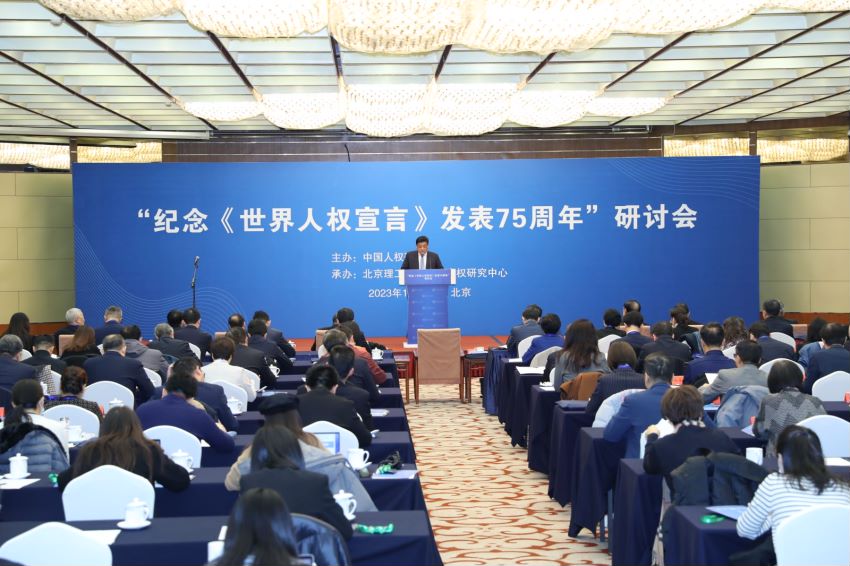
Padma Choling, director of the China Society for Human Rights Studies, delivers a speech on Monday. [Photo provided to chinadaily.com.cn]
Dec.5, 2023 -- During a seminar held by the China Society for Human Rights Studies on Monday to commemorate the 75th anniversary of the Universal Declaration of Human Rights, the society's president Padma Choling highlighted China's role as a contributor, advocator and practitioner of the declaration over the years.
While some countries highly politicize and weaponize human rights, China has played a very important role in promoting the development of international human rights, calling for a comprehensive human rights system, said experts.
The seminar was held ahead of International Human Rights Day on December 10, the day when the Universal Declaration of Human Rights was adopted by the United Nations General Assembly in 1948, to commemorate this milestone document and its development over the decades.
More than 70 participants, including officials from central and national agencies, representatives from central media departments, human rights experts, scholars and representatives from various social organizations gathered together for the seminar held in Beijing.
Baimachilin, who is also a vice chairperson of the Standing Committee of the 13th National People's Congress (NPC), noted that China, as an active participant in drafting the declaration, infused the rich human rights philosophy inherent in Chinese civilization into the document during the drafting process.
Padma Choling said that the concept of benevolence and love in traditional Chinese culture injects a more universal value foundation into the Declaration, while the philosophy of harmony with nature in Chinese civilization provides ideological support for the declaration. He said that the concept of community in Chinese society supplements the declaration with a perspective of obligation, thereby providing feasible solutions for the comprehensive and free development of individuals.
The integration of Eastern culture makes the declaration a truly global human rights declaration, he noted.
For the past 75 years, China has been an active advocate of the spirit of the Declaration, consistently emphasizing that the development of human rights is a common cause for all humanity, Padma Choling said. China firmly rejects a singular understanding of the development path of human rights, and opposes the forced promotion of "universal" human rights systems. China's concept of building a community with a shared future for mankind has been incorporated into more than 10 resolutions of the UN Human Rights Council.
Nearly 100 million impoverished rural residents have been lifted out of poverty, and the world's largest education system, social security system, and healthcare system have been established in the country. China has practiced true multilateralism, actively participated in global human rights governance, and safeguarded the orderly operation of the international human rights mechanism with the United Nations at its core, said Padma Choling.
He called on researchers of human rights to become interpreters of the contemporary Chinese human rights perspective, construct a theoretical system and discourse system of Chinese human rights, showcase the image of China, and voice the country's opinions.
Li Lin, a member of the Chinese Academy of Social Sciences, noted that since the 18th Communist Party of China (CPC) National Congress, General Secretary of the CPC Central Committee Xi Jinping has regarded the development of human rights as an important task in governing the country. His series of important speeches, instructions, and expositions on respecting and protecting human rights have formed the contemporary Chinese outlook on human rights, the formation and practice of which are not only the best way to commemorate the Universal Declaration of Human Rights, but also the inheritance, innovation and major development of the basic spirit, purpose, values, and principles established by the declaration.
Ensuring that China's more than 1.4 billion people fully enjoy human rights and basic freedoms has also fully demonstrated the people's nature of human rights in China, deepened and expanded the basic principles of extensiveness, equality, and non-discrimination for people entitled to human rights established in the declaration and other international human rights documents, and promoted the innovative development of the theory of the people as the beneficiary of human rights, Li said.
In the past decade, the contemporary Chinese outlook on human rights has deeply penetrated into the political and cultural life of Chinese society, which fully reflects China's position as a defender and advocate of international human rights, Chang Jian, director of the Human Rights Research Center at Nankai University, told the Global Times on Monday.
China's development in human rights is more pragmatic, noted Chang, who is also a participant of the seminar. "We have provided better conditions for the realization of dignity and values by creating a stable and peaceful development environment. For example, by alleviating poverty, we enable the vast population to enjoy the rights to survival, development and other human rights."
Chang pointed out that China also plays a very important role in promoting the development of international human rights.
"While some Western countries highly politicize and weaponize human rights issues, China emphasizes unity and cooperation in international human rights cooperation," Chang said. "China opposes imposing a certain Western model of human rights on all countries, but instead promotes an inclusive spirit. Because different countries have different conditions, the way human rights are practiced will also vary."
In recent years, some Western countries have been relentless in smearing China's human rights situation. In response, Chang said that some countries have a narrow definition of human rights, while China is calling for a comprehensive human rights system.
Some Western countries believe that writing human rights into laws is a guarantee of human rights, but this is not in line with the actual and real effects, he said, pointing out that what China is doing is to achieve actual human rights through policy-making and creating conditions, which these blind critics failed to achieve.


